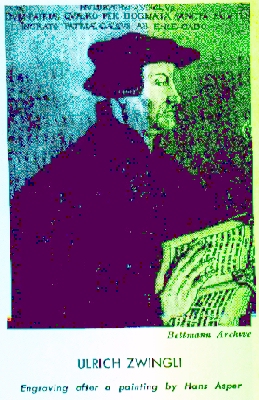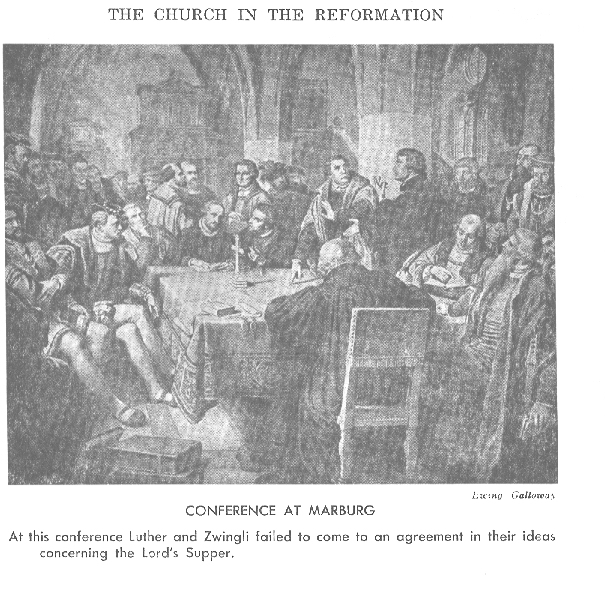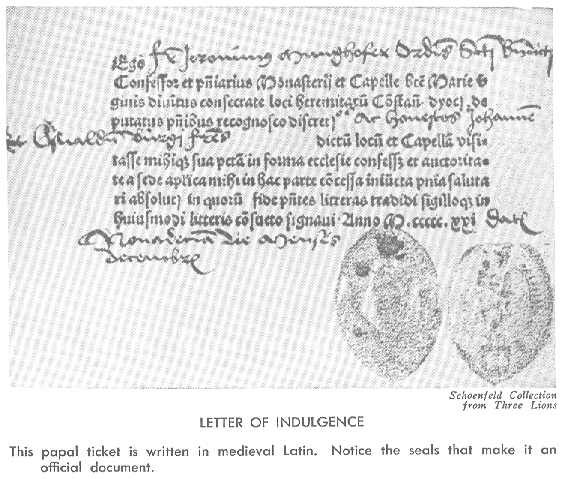|
|
|
 Zwingli
Comes under the Influence of Luther
Zwingli
Comes under the Influence of Luther
On January 1, 1484, there was born in Wildhaus in the German speaking part of Switzerland a boy who was to become known to history as Ulrich Zwingli. His father was a prosperous farmer.
Zwingli's experience differed greatly from that of Luther. He never lived as a monk in a convent. He did not have Luther's deep consciousness of sin, and he knew nothing of Luther's fearful spiritual struggle to gain salvation. Luther emerged out of the darkness of medievalism, and had been educated in scholastic theology; he studied the great writings of the Church Fathers and other works written under the influence of the Medieval Church. Zwingli received his education under the influence of the Renaissance, that is, under the influence of the new interest in the ancient writings of the Greeks and Romans, which had recently been brought to the western world. These Greeks and Romans had lived before the time of Christ and had possessed no knowledge of the Word of God.
Zwingli studied in Basel, Bern, and Vienna. In 1506 he received the degree of Master of Arts. Thereupon he entered the service of the Church. In 1519 he became pastor of the church of Zurich, the most important city in that part of Switzerland. He was also chaplain in the army of the city of Zurich.
At first Zwingli stood strongly under the influence of Erasmus1, with whom he became personally acquainted. He made a thorough study of the New Testament and of the Church Fathers. Originally he had no intention of attacking the Roman Church. Like Erasmus, he hoped to bring about improvements gradually through education. He first arrived at certain reformatory ideas independent of Luther. Later he came under Luther's influence, and moved further and further away from the position of Erasmus.
Zwingli Reforms the Church in Switzerland
In 1518 Zwingli attacked indulgences2. The stand Luther took in the Leipzig Debate, and his burning of the papal bull inspired Zwingli to make a systematic attack on the Roman Church.
Images were removed from the church buildings in Zurich. The mass was abolished. Altars, relics, and processions were discarded. The government of the Church and the care of the poor were placed in the hands of the city council. The school system was reformed.
From Zurich the Reformation of the Church spread to several of the Swiss cantons; but many cantons remained Catholic.
Zwingli Differs from Luther
Zwingli differed from Luther in his idea of the Lord's Supper. As we have seen, Luther took the words, "This is my body," literally. He taught that the body of Christ, having become everywhere present at His ascension, is actually present in the bread and wine. Zwingli taught that the body of Christ is now only in heaven, and that the words "This is my body" mean: "This signifies my body." According to Zwingli the bread and the wine are only symbols of the body and blood of Christ, and the Supper is only a memorial ceremony.

In October, 1529, Luther and Zwingli held a conference in Marburg,
but the two leaders of the Reformation could not come to an agreement.
For a time Zwingli had considerable influence in southern Germany. But after his death the Protestants in that region inclined more and more toward Luther, and the Zwinglian movement became confined to German-speaking Switzerland.
Zwingli Meets an Early Death
Zwingli's death took place on October 11, 1531. War had broken out between the Catholic and them Protestant cantons. As chaplain, Zwingli accompanied the Protestant army. It was defeated in the battle near Kappel, and Zwingli was killed. His body was dismembered and burned.
1aAbout the middle of the fourteenth century, during the "Babylonian Captivity," there arose in the Netherlands another attempt to reform the Church. This movement was that of the Brethren of the Common Life. It was founded by Gerhard Groote, under the influence and with the help of John Ruysbroek. The Brethren of the Common Life were strong believers in Christian education. They hoped to bring about reform in the Church by means of education.

2 The Practice
of Indulgences ... the Church permitted the penitent to substitute the
payment of a sum of money for other forms of penalty or satisfaction.
The Church would issue to the penitent an official statement that he had
received release from other penalties through payment of money. Such
a document or papal ticket was called an indulgence. Money
thus paid in place of other penalties amounted to what we would call a
fine. Not only could one buy indulgences for one's self, one could
also buy indulgences for relatives and friends who had died and passed
into purgatory, and in this way shorten the time they would otherwise have
to spend in the place of purification. The practice of granting indulgences
was based on the Catholic doctrine of works of supererogation.
Works of supererogation were works done beyond the demands of God's law.
These works earned a reward.
|
|
|
|
|
|
| Schneider
/ Snider
/ Snyder
GenForum |
If anyone has pictures or human interest stories dealing with someone listed
on these sites,
I would be most grateful to see/hear them. :)